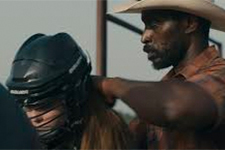Bull
|  Documentarian Annie Silverstein’s feature narrative debut Bull, which she cowrote with her husband and coproducer Johnny McAllister, centers on the relationship between Kris (newcomer Amber Havard), a 14-year-old girl struggling quietly with the pains of impoverished adolescent turmoil, and Abe Turner (Rob Morgan), an aging former star bull rider who is barely making ends meet working as a bullfighter on the Texas rodeo circuit. Kris is living with her younger sister and alcoholic grandmother (Peggy Schott) in a decrepit, rural suburb of Houston because her mother (Sara Allbright) is in prison. Abe lives next door, but he is frequently gone working rodeos around the state. Their paths cross when Kris, trying to impress some of her delinquent friends, throws an impromptu party in his empty house one weekend, which is summarily trashed by the group of drunken, rowdy teenagers. Abe catches her the next morning, and because he is a decent (if decidedly rough-around-the-edges) man, he allows her to make it up to him by cleaning his house and working odd jobs for him, rather than sending her to juvenile detention (which, on some level, is where she believes she belongs). The fact that Kris is white and Abe is black is not a central point of the drama (although her friends demonstrate their casually racist bona fides in their language), but it does provide one of many points of difference that define their distinct, yet overlapping worlds. Bull is an inherently fascinating film because of its being set against the black rodeo circuit in Texas, a unique subculture that many outside of it are probably not even aware exists. Silverstein noted in a recent interview with Variety that she happened upon it while location scouting for a short film and subsequently spent several years researching it and interviewing bullfighters, which clearly contributed to the film’s live-in, almost documentary-like sense of place and community. Ironically, it is within the world of the black rodeo circuit that Kris starts to find her place and her voice, as she begins to entertain ideas that she might become a bull rider. Abe, whose body has been beaten and broken by his profession and whose daily struggles with pain and limited mobility are a far cry from his glory days as an above-the-marquee rodeo star, takes her on as a protégé, partially because he wants to help her and partially because he wants to leave some kind of legacy. Rob Morgan gives Abe a hardened, world-weary sensibility that nevertheless has plenty of cracks, particularly when an old girlfriend (Yolonda Ross) briefly resurfaces in his life. He is a solitary man who needs some kind of connection, which Kris, with her aimless life and lack of genuine role models, desperately needs, as well. Kris is not a bad kid—she clearly cares for her younger sister and has a fundamental sense of right and wrong—but she is deeply flawed in the way she allows herself to be swayed by the other, more aggressive, and more felonious kids around her, particularly Daryl (Reece McClure) and his older brother Billy (Steven Boyd), who lure her into selling drugs and, possibly, herself. She is one of those gentle souls who is trapped in the kind of bad circumstances—a combination of socio-economic deprivation and a constant cloud of negative influence—from which it seems nearly impossible to escape, and much of the film’s drama and tension resides in the question of whether she will ultimately be strong enough to escape the clutches of the situation into which she was born. Amber Havard, like all of the young actors in the film, has never appeared in a film before, and she has a natural presence that never feels forced. She is awkward in ways that feel just right; she has an inherent sadness to her because we sense what she could be in different circumstances. In its best moments, Bull’s close, direct observation of character and intimate rendition of time and place, as well as its unforced narrative and simple rhythms, reminded me of the films of Jean-Pierre and Luc Dardenne. It is not surprising that Bull debuted at the Cannes Film Festival, which was long favored the Dardennes’ work (they have won the Palm d’Or twice—so far—and their most recent film, Young Ahmed, played at the 2019 festival, where Bull was featured in the Un certain regard section). Silverstein and cinematographer Shabier Kirchner give the film a distinct, naturalistic visual intimacy that belies the widescreen frame. Their camera is often close, but never pressing, and they give us moments of respite that are crucial to the film’s natural flow. Like the neorealist films from which it descends, Bull presents us with a world populated by characters who would otherwise be overlooked and endows them with a sense of humanity and importance. It doesn’t offer anything patently profound or seek to answer grand questions, but rather presents us with recognizable human beings from different walks of life struggling—sometimes succeeding, sometimes failing—to find their place. Copyright © 2020 James Kendrick Thoughts? E-mail James Kendrick All images copyright © Samuel Goldwyn Films |
Overall Rating: 


 (3.5)
(3.5)


